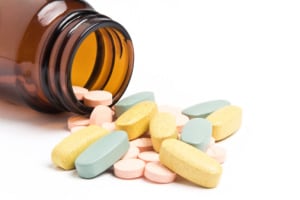
Jaundice, liver failure and even death can result from taking herbal and dietary supplements that might be toxic to your liver. (Emel Yenigelen/Getty Images)
Even commonly used vitamins and nutritional supplements can cause serious liver damage, reports the American College of Gastroenterology. Its new guidelines point out that jaundice, liver failure and even death can result from taking herbal and dietary supplements that might be toxic to your liver.
Many of us know that the potions that pack the shelves at the local health food store are not approved by the Food and Drug Administration. Nevertheless, we have become comfortable with the idea that they are safe. That may be true for basic multi-vitamins, but there are hidden health risks associated with many natural remedies.
The new guidelines include a list of supplements that may harm your liver. Green tea weight-loss supplements (not the tea itself) top the list. Why? The supplements often have 700 milligrams of catechins, a level far above the 50–150 milligrams found in a cup of green tea. “This can be dangerous when the pills are taken several times a day,” says Herbert L. Bonkovsky, M.D., the director of the liver, digestive and metabolic disorders laboratory at Carolinas HealthCare Systems in Charlotte, N.C.
Check Your Herbs and Vitamins Here
The National Institutes of Health have a quick, simple tool to help you find the latest information on the safety of your favorite supplements. Go to LiverTox, type your supplement name into the search box and find out if there’s research on risks.
Other supplements that have been found toxic include: chaparral, comfrey tea, kava, skullcap, and yohimbe, along with doses of vitamin A above 5,000 milligrams a day.
Tips to Stay Safe
Keep your doctor in the loop. Always give your doctor a complete list of everything you are taking. You never know what will interact with a prescription medication.
Take as little as possible. More is not better when taking lots of vitamins, herbs and prescriptions. Take as few as possible and be sure you read as much as you can about the supplements you choose to take.
Never exceed the recommended dosage. Stick with the dosage on the label and steer clear of products with massive doses of ingredients.
If you have liver disease, talk with your doctor before adding any supplement to your regimen.
Buy the best. Do not shop for bargains. Look for highly rated brands with standardized ingredients and long track records of safety.
Weed out the wacky. If a supplement promises to cure cancer, stop menopause or melt fat, drop it like a hot potato. Also, steer clear of products with long lists of ingredients or that promise miracle results. If you’re buying an herb, buy only the single herb; avoid combination formulas.








